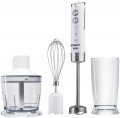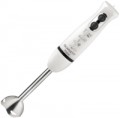Grinding bowl
The working volume of the grinding bowl, supplied with the device.
For more information about the bowl for grinding, see "Capacities". And the amount of product that can be grinded in the device in one load directly depends on its volume. At the same time, keep in mind that a larger bowl takes up more space, costs more, and also requires a more powerful engine. Therefore, manufacturers usually select this volume taking into account the overall level and performance of the device.
Power
The rated power of the device, in fact, is the power of the engine installed in it.
The higher this indicator, the more performant this model is, the more suitable for “heavy” work and the more applications can be provided in the design. For example, in the case of mixers (see “Appliance type”), a power of up to 250 W is considered good for liquid products; for more solid tasks, like kneading tough dough, you should pay attention to more powerful models. Detailed recommendations on optimal power can be found in special sources.
Note that powerful devices are usually equipped with more durable nozzles that can withstand high loads.
Max. revolutions
The maximum speed of rotation of the working part of the nozzle, which the device can support. The maximum speed mode is designed for grinding and mixing solids. When the special “Turbo Mode” is activated, the maximum speed is switched on for a short time, which allows the blender/mixer to chop nuts, dried foods and much more. Additionally, the maximum speed is activated in the pulse mode, which is used for crushing ice.
Number of speeds
The number of speeds of rotation of the nozzles provided in the mixer / blender.
The presence of several speeds allows you to adjust the operating mode of the device to a particular situation. For example, a liquid omelet can be whipped at high speed, but it is better to choose a slower mode for kneading dough. The more speeds provided in the device, the more versatile it is, the more accurately it can be configured for a specific task. In simple household models, from 3 to 6 settings are usually provided, in the most advanced devices their number can reach two dozen.
Smooth speed control
A control that allows you to
smoothly change the speed of rotation of the mixer nozzles - for more precise adjustment of the speed and setting the optimal mode for different products. With step speed control, a situation may arise when a higher speed value is already too high, and a lower speed is not yet enough. Stepless control avoids such situations.
Nozzles
—
Blending arm. A blending nozzle is a long rod-like attachment with a protective cap at one end, containing a bladed knife. It can be attached to a conventional mixer, essentially turning it into a blender.
—
Wide blending arm. A blending nozzle, or blending arm, is a long rod-shaped attachment with a protective cap at one end, housing a bladed knife. The wider width of the blending arm allows for faster blending and easier processing of larger quantities of food products.
—
Beaters for whisking. Whisking nozzles for liquids such as cream, eggs, and batter, are commonly found in modern mixers as a standard attachment.
—
Kneading hook. Special nozzles in the form of thick wire spirals, designed for kneading thick dough.
—
Knife for chopper. A cutting-type attachment with blade knives attached to the bottom of a cylindrical shaft and turned at a 180-degree angle to each other. It is used for grinding ingredients of different hardness in the blender jar. The cutting elements of such knives can have both straight and serrated blades.
—
An ice pick. An ice pick is a specialized tool for crushing ice, nuts, and frozen fruits/berries. Its serrated blades make it easier to break the solid structure of ice without dulling the blades. I
...t is commonly used with powerful blenders that come with a glass or metal chopper bowl. Although not all blenders include an ice pick, it can be purchased separately along with a heavy-duty chopper bowl main function crushing ice and other hard ingredients.
— Knife for kneading dough. The kneading knife is ideal for making yeast dough with a less dense structure in small quantities. It can also be used for mixing and whipping creams. Typically, this type of knife is made from durable plastic that pulls the mass rather than cutting it like steel. For larger volumes of dough, it is recommended to use a specialized hook attachment instead.
— Disc for shredding/slicing. A slicing disk is a circular attachment with slots that function as blades when rotated. This feature enables it to rapidly and uniformly slice fruits and vegetables into thin pieces, making it particularly useful for processing large quantities of food.
— For dicing. This attachment is designed to cut fruits and vegetables into small, uniform cubes. It is particularly useful for preparing salads and traditional soups.
— For puree. This is a plastic attachment typically used for creating smooth purees and thick blends from fruits and vegetables.
The presence of a sieve in the delivery set of the device.
— Pulp sieve. Typically found in conventional blenders, this device is a vertical tube with fine mesh walls that fits into the bowl and sits atop the blade. Its primary function is to separate pulp from fruit and vegetable juices: produce is placed inside the tube, the blade crushes it, and the juice is filtered through the mesh into the bowl while the pulp remains inside the tube.
— Cappuccinatore (frother). This device is specifically designed for creating milk foam and is used only with specific appliances (refer to "Device type - Foamer"). It typically consists of a bowl with a foaming mechanism at the bottom, rather than a nozzle, and is often not detachable.
Other types of nozzles, in addition to those described above, can be supplied in the kit.
